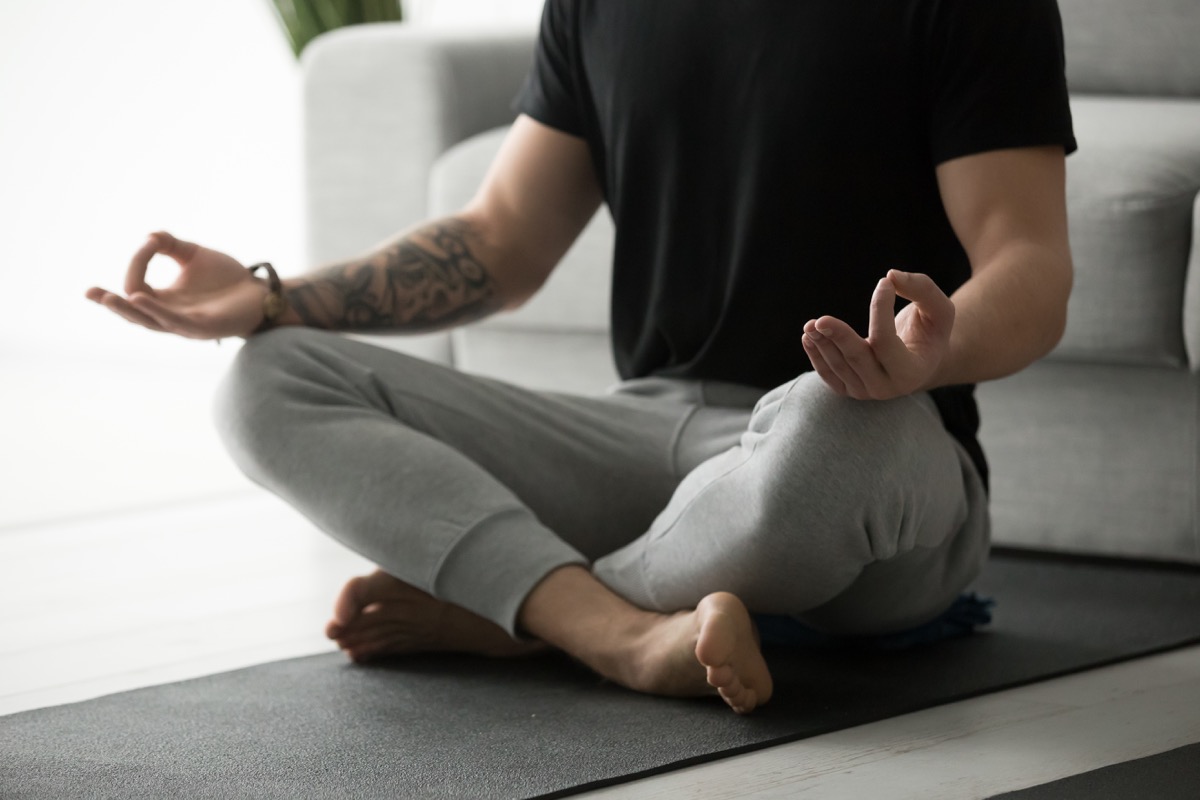"Solar Winter" Is Here—How to Keep It From Ruining Your Mood, Therapists Say
Keep your spirits high even during the darkest days.

As winter approaches, we've now entered the darkest time of the year, known to some as "solar winter." Spanning roughly from Nov. 6 to Feb. 3, and peaking at the winter solstice on Dec. 21, this is a period marked by the fewest daylight hours in the Northern Hemisphere, according to USA Today. The mental health effects of solar winter are especially stark right now, thanks to daylight savings: As we reset the clocks, it's common to experience abrupt changes to mood, energy levels, and more.
The good news? Therapists say there are a few key ways to ensure that you get through this dark and often depressing quarter of the calendar emotionally intact. Read on to hear mental health experts' best tips on keeping your spirits high.
RELATED: 15 Life-Changing Habits to Add to Your Wellness Routine.
1
Spend ample time outside during peak hours of light.

One of the best things you can do to keep your mood up during solar winter is to spend time outdoors during the brightest hours of the day—even when the weather is poor.
"This helps with mindfulness and feeling present and grounded in the moment," explains Heidi McBain, LMFT, LPC, PMH-C, an online therapist and coach.
It can also help your body get the vitamin D it needs to regulate your mood since vitamin D deficiency can mimic symptoms of depression. Consuming fortified foods or taking vitamin D supplements can also help you ensure adequate intake.
RELATED: People Who Live to 100 Have These 3 Things in Common, New Research Shows.
2
Try light therapy.

When you can't seem to get enough sunshine to boost your mood naturally, light therapy has been shown to reduce symptoms of seasonal affective disorder (SAD) by resetting your circadian rhythm and boosting your serotonin levels.
"It's thought that this type of light may cause a chemical change in the brain that lifts your mood and eases other symptoms of SAD, such as being tired most of the time and sleeping too much," explains the Mayo Clinic.
Their experts recommend speaking with a doctor before beginning light box therapy, especially if you have been diagnosed with bipolar disorder.
RELATED: 9 Easy Ways to Instantly Feel Happier on a Rainy Day, Experts Say.
3
Engage in regular exercise.

Keeping active during the dark months of solar winter can also keep your mood from plummeting. The Centers for Disease Control and Prevention (CDC) recommends getting at least 150 minutes of moderate-intensity exercise each week—and aiming for some physical movement every day can help reduce your symptoms of seasonal depression.
"Staying physically active releases endorphins, serotonin, and other mood-enhancing chemicals," says Taylor Wilson, a certified recovery specialist and the founder of Active Recovery Companions. "Additionally, exercise helps regulate sleep patterns, reduces anxiety, and increases self-confidence, all of which contribute to a better mood."
RELATED: Silent Walking Is the Latest Wellness Trend Everyone's Talking About.
4
Cultivate mindfulness.

A 2022 study published in the Journal of Affective Disorders Report followed 77 people with SAD over two years and found that they reported lower levels of mindfulness during the winter compared with other seasons. That's why many of the therapists we spoke to suggested establishing a mindfulness practice in the early days of solar winter.
"Practicing relaxation techniques such as deep breathing, meditation, or yoga can help reduce stress and enhance mood. These practices promote a state of calmness, improve self-awareness, and reduce negative thinking patterns," says Wilson.
RELATED: Hot Yoga Can Reduce Depression by 50%, New Study Says—The Easy Way to Start.
5
Connect socially.

Staying connected to others during the dark winter months can be another powerful tool in boosting your mood and avoiding a prolonged state of depression during solar winter.
"Social interaction can significantly impact your mood. Even when it's tempting to withdraw, maintaining social contacts and engaging in social activities can provide a significant boost to your mood," says Niloufar Esmaeilpour, MSc, RCC, SEP, a therapist with Lotus Therapy & Counselling Centre in Vancouver, Canada.
If you feel that your current social network is lacking, Wilson suggests joining a support group or reaching out to a therapist who can provide a listening ear and understanding.
RELATED: 8 Houseplants That Improve Your Mental Health, Science Says.
6
Maintain a healthy sleep routine.

Getting a good night's rest—at least seven to nine hours of sleep for most adults—is another important way to care for your mental health during solar winter.
"Consistent sleep patterns are crucial for emotional well-being. Aim for a regular sleep schedule and create a conducive sleep environment by minimizing noise, light, and distractions. Practicing good sleep hygiene will help regulate mood and energy levels," notes Wilson.
RELATED: 6 Bedtime Routines That Will Help You Sleep Through the Night.
7
Keep a gratitude journal.

With all of the hard things that happen in this world—and a 24-hour news cycle that delivers it all to your doorstep—it can be hard to focus on the positives in life. Solar winter only adds to the challenge of staying optimistic and grateful.
However, writing in a gratitude journal may help you highlight the things that still fill your life with joy and richness, even during difficult times.
"Keeping a gratitude journal or simply reflecting every day on the things you are thankful for can significantly boost your mood," says Bayu Prihandito, a life coach and the founder of Life Architekture. "Gratitude shifts our focus from what's lacking to what's abundant in our lives, fostering a more positive and outgoing mindset."
For more mental health tips sent directly to your inbox, sign up for our daily newsletter.
Best Life offers the most up-to-date information from top experts, new research, and health agencies, but our content is not meant to be a substitute for professional guidance. When it comes to the medication you're taking or any other health questions you have, always consult your healthcare provider directly.





















